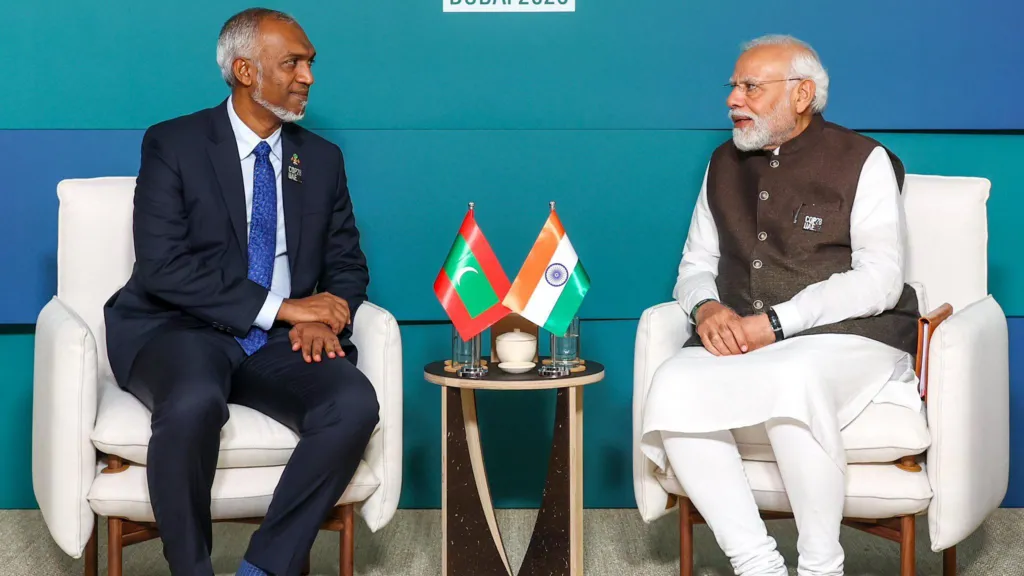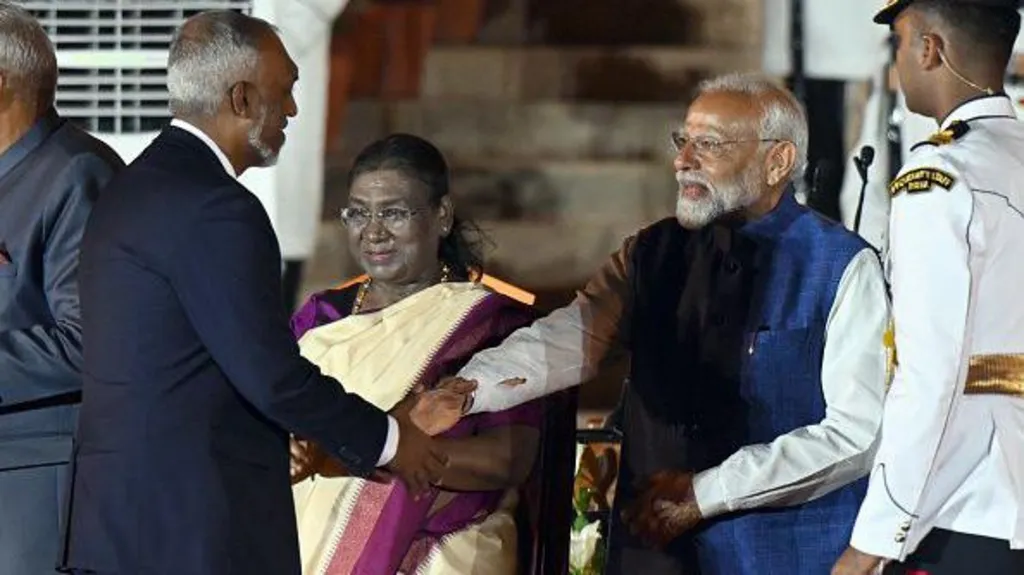Maldivian President Mohamed Muizzu is anticipated to request a bailout during his visit to India this week, as the island nation faces an economic crisis and concerns about a potential debt default.

This marks Muizzu’s first official bilateral visit since he was elected to power late last year, following a campaign focused on an ‘India out’ policy, pledging to diminish Delhi’s influence.
How have relations between the Maldives and India changed since Muizzu’s election?
Since then, relations between the two nations have been tense; however, experts suggest that the visit shows the Maldives cannot afford to overlook its larger neighbor.
As of September, the Maldives’ foreign exchange reserves were approximately $440 million (£334 million), barely enough to cover one and a half months of imports.
Last month, global ratings agency Moody’s lowered the Maldives’ credit rating, stating that “the risks of default have significantly increased.”
A bailout from India would strengthen the country’s foreign currency reserves.
Shortly after assuming office, Muizzu opted to visit Turkey and China before heading to India—his trip to Beijing in January was perceived as a significant diplomatic slight to Delhi, as prior Maldivian leaders typically visited Delhi first after their elections. Concurrently, a controversy arose in India when three Maldivian officials made insulting remarks about Prime Minister Narendra Modi.
Immediately after taking office, Muizzu chose to travel to Turkey and China before visiting India—his January trip to Beijing was seen as a notable diplomatic snub to Delhi, given that previous Maldivian leaders usually made their first post-election visit to Delhi. At the same time, a scandal emerged in India when three Maldivian officials made disparaging comments about Prime Minister Narendra Modi.

How many coral islands and atolls comprise the Maldives?
The Maldives is made up of approximately 1,200 coral islands and atolls situated in the heart of the Indian Ocean. The archipelago has a population of around 520,000, in contrast to India’s 1.4 billion residents.
As a small island nation, the Maldives relies heavily on its larger neighbor, India, for the majority of its food, infrastructure development, and healthcare services.
While neither Delhi nor Male has officially stated that a financial package for the Maldives will be addressed during the visit, experts believe it will likely be a topic of discussion.
“The main focus of Muizzu’s visit is to obtain financial assistance through grants and to restructure debt repayments,” a senior Maldivian editor, who wished to remain anonymous, informed the BBC.
Muizzu is also aiming for a “$400 million currency swap arrangement requested by the Maldives central bank to replenish its dwindling foreign exchange reserves,” he stated.
The ratings agency Moody’s raised serious concerns about Male’s financial health, noting that “(foreign) reserves are substantially lower than the government’s external debt obligations of approximately $600 million in 2025 and exceeding $1 billion in 2026.”
The Maldives’ public debt stands at approximately $8 billion, which includes around $1.4 billion owed to both China and India.
“Although Muizzu has repeatedly claimed that China has signaled approval for a five-year deferment of debt payments, financial aid from Beijing has yet to materialize,” the Maldivian editor noted.
With no other countries stepping in to provide support, it seems Muizzu is now seeking to repair strained relations with India.
“It’s about recalibrating the tone and addressing the negative rhetoric from high-ranking officials in Muizzu’s administration that has significantly affected Indian tourist arrivals,” says Zahir.
India has historically exerted significant influence over the Maldives, whose strategic location allows it to oversee a vital section of the Indian Ocean. However, Muizzu aimed to shift this dynamic by aligning more closely with China.
In January, Muizzu’s government issued an ultimatum to India, demanding the withdrawal of approximately 80 troops stationed in the country. Delhi clarified that these personnel were there to operate and maintain two rescue and reconnaissance helicopters, as well as a Dornier aircraft donated years earlier.
Ultimately, both nations reached an agreement to replace the troops with Indian civilian technical staff to manage the aircraft.
A month after taking office, Muizzu’s administration also declared that it would not extend a hydrographic survey agreement with India, which had been signed by the previous government to map the seabed in Maldivian territorial waters.
What controversial remarks did Muizzu’s deputy ministers make about Modi?
A controversy erupted after three of Muizzu’s deputy ministers made inflammatory remarks about Modi, referring to him as a “clown,” “terrorist,” and a “puppet of Israel.”
These comments sparked outrage and prompted calls for a boycott of the Maldives across Indian social media. Male stated that the remarks were personal and did not reflect the government’s position. As a result, the three ministers were suspended from their cabinet roles.
In what appeared to be a subtle criticism of the backlash on Indian social media, Muizzu remarked at the time, “We may be small, but that doesn’t grant anyone the license to bully us.”
Table of Contents


জুনিয়র ডাক্তারদের ‘আমরণ অনশন’ অবস্থা । জয়নগরের পরিস্থিতি । মমতার পুজো উদ্বোধন… দিনভর আর কী কী করছে
